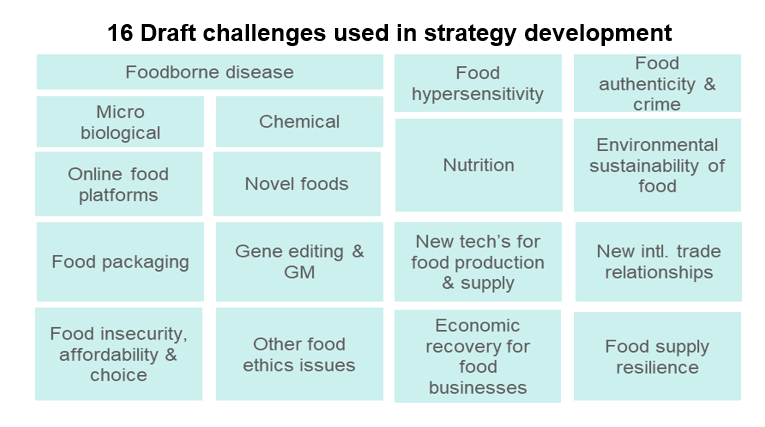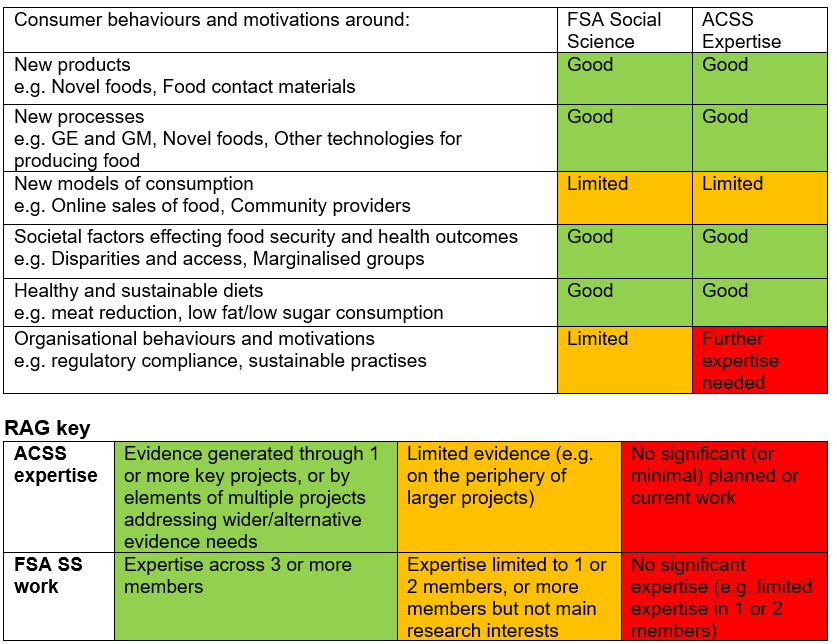Social Science Coverage of FSA Strategy Themes Paper 8.8
On this page
Skip the menu of subheadings on this page.Background:
The FSA is in the process of developing a new strategy for the next three years. This will replace the ‘agile’ approach to strategy that that FSA Board agreed in January 2020, reflecting the significant uncertainty that the FSA faced at that time.
We believe that the FSA should keep its core focus on food safety and standards, but we also want to recognise the significant challenges the food system faces relating to health and sustainability. We have a role to play supporting wider government efforts on these challenges in the coming years.
Our role is reflected in the three (draft) parts of the FSA’s vision:
1. Food is safe: We will continue to prioritise our core role protecting consumers by preventing and responding to disease and contamination of food, in order to keep the level of foodborne disease low. The way food is produced, sold and consumed, is changing, and we will continue to adapt and innovate to protect consumers.
2. Food is what it says it is: Consumers should be confident that food is what it says it is. That’s why we will continue to prioritise the second part of our core role implementing and enforcing food authenticity rules.
3. Food is healthier and more sustainable: We need to play our part supporting government partners and others in the wider food system to make it easy for consumers to have access to a healthier and more sustainable diet.
The strategy itself will not pin down or publish a specific list of problems to address within each of these. This reflects the uncertainty over developments in the coming years (e.g. the outcome of the National Food Strategy White Paper), and in particular the need to develop our evidence base around food that is healthier and more sustainable. This leaves us agility to adapt to changes that emerge. However, during development of the strategy, using the results of work such as horizon scanning, we identified 16 ‘challenges’ the food system faces, which are shown below. These were used to inform the update of our vision, but will not themselves be a part of the new strategy.
16 Draft challenges used in strategy development
 While these challenges are not explicitly included in the final strategy, they provide a good initial idea of areas where we may need to grow our evidence base. While many of these are existing priorities for the FSA, we have identified 6 emerging topics for social science research:
While these challenges are not explicitly included in the final strategy, they provide a good initial idea of areas where we may need to grow our evidence base. While many of these are existing priorities for the FSA, we have identified 6 emerging topics for social science research:
1. Organisational behaviours and motivations, e.g. Food businesses and Local Authorities
Consumer behaviours and motivations around:
2. New products, e.g. Novel foods, Food contact materials
3. New processes, e.g. GE or GM, Novel foods, Other technologies for producing food
4. New models of consumption, e.g. Online sales of food, Community providers
5. Societal factors effecting food security and health outcomes, e.g. Disparities and access, Marginalised groups
6. Healthy and sustainable diets, e.g. meat reduction, low fat/low sugar consumption
To ensure we have sufficient social science coverage of strategy topics, the secretariat are undertaking an assessment of how well these themes are covered by a) current/planned social research projects and b) expertise in the ACSS. We are carrying out this assessment on the draft strategy to assist early identification of any gaps to inform a) FSA business planning and b) ACSS recruitment.
This paper presents an initial assessment, by the secretariat, of social science coverage of strategy themes. To build on this, we will be asking ACSS members to carry out a self-assessment of their expertise in strategy themes. Whilst this initial exercise has focused on topics, ACSS members will have social science research capability that can be applied across topics (i.e. risk perceptions, attitudinal research). As such we will also be asking members to self-assess research/methodological expertise, to provide a more holistic review.
Findings: Table 1 shows the outcome of the initial assessment, showing that most themes have good coverage within current/planned social science projects, with further evidence generation possibly needed in the themes of ‘New models of consumption’ and ‘Organisational behaviours and motivations’. Following finalisation of the strategy, the Social Science team will work with FSA colleagues to identify what can be usefully done in these themes. There is also good coverage in terms of ACSS expertise, with expertise across 3 or more members for most themes. Dependant on the self-assessment exercise, further expertise may potentially be needed under the same 2 themes: ‘New models of consumption’ and ‘Organisational behaviours and motivations’.
Next Steps:
The secretariat will design a self-assessment survey and circulate to members for completion. The initial assessment will be revised in line with the self-assessment and subsequently used to inform the recruitment campaign.
The topics for future social science research will be considered on an ongoing basis as we grow our expertise and experience in these areas.
Table 1: Initial assessment
Coverage of emerging topics from FSA strategy by a) FSA social science work (current and planned) and b) ACSS expertise.
